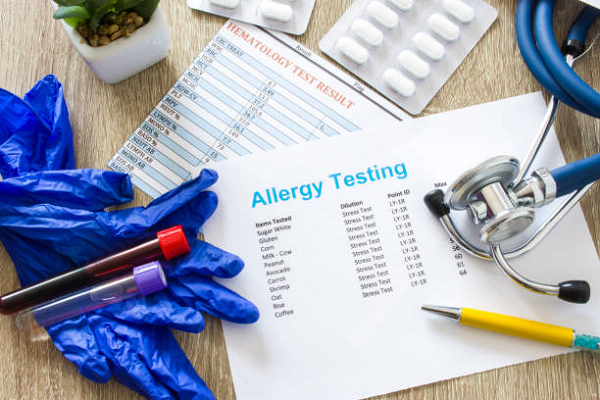Festival Season without the Sneezing: Enjoying Tennessee’s Summer Events Allergy-Free
Summer in Tennessee is synonymous with vibrant festivals and lively outdoor events. From the soulful tunes at the Music City Jazz Festival in Nashville to the family-friendly Blackberry Jam Music Festival at Harlinsdale Farm, there’s an abundance of joy in the air. However, for those with allergies, the season can bring a different kind of blues. But fear not! Community Quick Care (CQC) is here to ensure that allergies don’t dampen your festival spirit.
Allergy Skin Testing: Your Ticket to an Uninterrupted Summer
At Community Quick Care, we understand that managing allergies is crucial to enjoying the summer to its fullest. That’s why we offer comprehensive Allergy Skin Testing and Immunotherapy Treatments in Tennessee. Our process is quick, simple, and non-invasive. We test for 48 different allergen sensitivities, ensuring that we pinpoint exactly what’s causing your discomfort. And the best part? It’s 100% covered by TENNCARE.
Immunotherapy: Dance to the Rhythm of Relief
For those who test positive, our custom-mixed, all-natural allergy medication promises a long-term solution. Imagine attending every concert, every festival, without the need for constant medication. With our Allergy Immunotherapy, you’re looking at 15-25 years of allergy symptom relief. Say goodbye to the sneezing and hello to the season’s thrills!
Seize the Summer: Allergy-Free Festivities a Test Away
Tennessee’s summer is ripe for adventure, with day trips to the West Tennessee Strawberry Festival and weekends swaying to the Southern Skies Music & Whiskey Festival. Not far behind is the sizzle of the World Championship Barbecue Cooking Contest. These escapades are just a test away from being enjoyed without the worry of allergies, thanks to Community Quick Care’s Allergy Skin Testing.
Allergy-Free Tips for Outdoor Fun
To make the most of these events, here are some tips to keep allergies at bay:
- Check Pollen Counts: Before heading out, check the local pollen forecasts. Choose days with lower pollen counts for your outdoor adventures.
- Protective Gear: Sunglasses and wide-brimmed hats aren’t just fashion statements; they’re your first line of defense against pollen.
- Post-Event Care: After returning home, change and wash your clothes to remove any lingering allergens.
With CQC’s Allergy Skin Testing and Immunotherapy, you’re well-equipped to dive into Tennessee’s festival season headfirst. So, schedule your test today, and prepare to experience summer in Tennessee as it should be: full of life, music, and clear skies, both overhead and in your sinuses.
Celebrating Men’s Health in June: A Guide to Living Your Best Life
June shines a spotlight on an important aspect of healthcare: National Men’s Health Month. It’s a time to encourage the men in our lives to take proactive steps towards managing their health and well-being. At Community Quick Care, we’re dedicated to supporting men at every stage of their journey towards optimal health.
Understanding Men’s Health Risks
Men face unique health challenges, and it’s essential to understand the risks. Conditions like hypertension, diabetes, and heart disease are prevalent among men, often exacerbated by lifestyle choices and genetics. Regular health-risk assessments and screenings can be life-saving, and they’re a fundamental part of the care we provide.
The Importance of Preventive Care
Preventive care is not just about avoiding illness; it’s about maintaining a healthy lifestyle. Routine checkups and personalized counseling play a significant role in preventing diseases before they start. Our comprehensive approach includes managing weight, allergies, sleep disorders, and more, ensuring a holistic path to health.
Erectile Dysfunction: Addressing a Common Concern
Erectile dysfunction (ED) is a sensitive issue that affects millions of men. It’s a condition that can impact self-esteem and relationships. We approach ED with the utmost confidentiality, offering effective treatments like Sildenafil to help men regain confidence in their intimate lives.
Staying on Top of Your Game with Annual Physicals
Annual physicals are a cornerstone of men’s health. They provide a clear picture of your current health status and can uncover potential issues early on. Our biometric screenings are thorough, checking everything from vital signs to family medical history, and they’re often covered by insurance at no cost.
A Partner in Your Health Journey
At Community Quick Care, we’re more than just a healthcare provider; we’re your partner in health. Whether it’s managing chronic conditions like COPD and hyperlipidemia or providing acute care, our team is here to support you. We offer a range of physicals, from DOT to sports physicals, tailored to meet your needs.
Take Action Today
Men’s health encompasses more than just treating illness—it’s about preventive care and enhancing quality of life. Conditions like hypertension and diabetes can be managed effectively with regular checkups and a healthy lifestyle. This June, let’s take action. Schedule your annual physical, get screened, and talk to our providers about any health concerns. It’s time to prioritize your health and embrace a future of vitality and wellness.
Safeguarding Your Skin in Tennessee’s Sun: The Importance of Skin Cancer Screening
In Tennessee, where the sun’s rays can be as enchanting as the region’s rich green landscapes, protecting your skin is crucial. The Volunteer State’s diverse climate means that while residents may occasionally witness phenomena like the aurora borealis due to solar activity, they also face the more frequent and tangible impact of UV exposure. The sun in Tennessee can be particularly intense, contributing to the risk of skin cancer, the most common cancer in the United States.
The Dangers of Sun Exposure Prolonged exposure to the sun’s ultraviolet (UV) rays can lead to more than just a painful sunburn. It can cause photoaging, which includes wrinkles, leathery skin, and sunspots. More critically, it can alter the DNA in your skin cells, leading to various forms of skin cancer, including melanoma, basal cell carcinoma (BCC), and squamous cell carcinoma (SCC). These conditions are not just cosmetic concerns; they can be life-threatening.
Prevention: Your First Line of Defense The good news is that skin cancer is one of the most preventable forms of cancer. Here are some key strategies to protect your skin:
- Seek Shade: Avoid direct sunlight, especially between 10 a.m. and 4 p.m., when UV rays are strongest.
- Wear Protective Clothing: Long-sleeved shirts, pants, wide-brimmed hats, and sunglasses can shield your skin from harmful rays.
- Apply Sunscreen: Use a broad-spectrum sunscreen with an SPF of 30 or higher, and reapply every two hours, or after swimming or sweating.
Early Detection and Screening Early detection of skin cancer can make a significant difference in treatment success. Regular self-examinations and professional screenings are crucial. Community Quick Care offers skin cancer screening services, where experienced healthcare professionals can check for signs of BCC, SCC, and other skin abnormalities. If they detect suspicious lesions, they can perform a biopsy to determine the appropriate treatment.
Community Quick Care’s Commitment
At Community Quick Care, the health of your skin is a top priority. Their team is dedicated to providing comprehensive skin cancer screenings and educating patients on the importance of sun safety. They understand the risks associated with sun exposure and are committed to helping you protect your skin and detect any issues early on.
While the sun can be enjoyable, it’s essential to take steps to protect your skin. By following preventive measures and utilizing screening services like those offered at Community Quick Care, you can enjoy the outdoors while safeguarding your health. Remember, when it comes to skin cancer, prevention, and early detection are key to keeping your skin healthy and cancer-free.
For more information on protecting your skin or to schedule a screening, visit Community Quick Care’s dermatology services.
Taking Care of Your Health: A Lifelong Journey with Community Quick Care Core Services
As we celebrate Older Americans Month this May, it’s a poignant reminder of the importance of self-care, especially as we age. While the month is dedicated to honoring the contributions of older adults, it’s also an opportunity to reflect on the significance of maintaining our health throughout all stages of life.
At Community Quick Care Core Services, we understand that taking care of yourself isn’t just a practice; it’s a promise to your future self. Our comprehensive range of services is designed to support you in this commitment, ensuring that as you age, you have access to the care you need to live a full and healthy life.
Preventive Care and Chronic Condition Management
Preventive care is the cornerstone of good health. Regular physicals, allergy testing, and lab testing are not just procedures; they’re proactive steps towards longevity. For those managing chronic conditions such as hypertension, diabetes, and high cholesterol, our clinic offers specialized treatment plans to keep these conditions under control, preventing complications and improving quality of life.
Acute Care and Specialized Services
Life comes with its share of unexpected health challenges. Whether it’s battling the flu, treating an infection, or needing immediate care for lacerations, our team is equipped to handle acute medical needs promptly. Our dermatology services ensure that your skin receives the best care, while our erectile dysfunction treatments offer renewed confidence and wellness.
Supporting Healthy Lifestyles
A healthy lifestyle is a balanced one, and at Community Quick Care Core Services, we’re here to support that balance. Our weight loss program and Semaglutide treatments are tailored to help you achieve and maintain a healthy weight, a critical aspect of preventing age-related diseases.
Comprehensive Health Screenings
Health screenings are vital checkpoints on your journey to wellness. From vision screening to electrocardiograms, we provide thorough examinations to detect any potential health issues early on. Our ‘Welcome to Medicare’ visits and DOT physicals are specifically designed to ensure that you’re not just living longer, but living better.
A Partner in Your Health Journey
As you navigate the path of aging, remember that you’re not alone. Community Quick Care Core Services is your partner in health, offering everything from asthma treatments to ADHD medication monitoring. We’re here to provide the care you need, when you need it, with the compassion and expertise you deserve.
This Older Americans Month, let’s renew our commitment to self-care. It’s not just about adding years to your life, but life to your years. At Community Quick Care Core Services, we’re honored to be a part of your journey to a healthier, happier you.
Move More Month: Taking Steps Towards a Healthier You
April is Move More Month, an initiative by the American Heart Association aimed at encouraging individuals to incorporate more physical activity into their daily routines. It’s a time to embrace the benefits of movement and make strides towards a healthier lifestyle. At Community Quick Care, we believe in the power of movement not only for improving cardiovascular health but also for supporting weight loss goals. Let’s explore how you can make the most of Move More Month and combine it with our weight loss services for optimal results.
Why Move More?
Regular physical activity has numerous benefits for both physical and mental well-being. From reducing the risk of chronic diseases like heart disease and diabetes to improving mood and boosting energy levels, there’s no denying the positive impact of movement. Move More Month serves as a reminder to prioritize physical activity and find enjoyable ways to stay active every day.
Tips for Moving More
The American Heart Association recommends getting at least 150 minutes of moderate-intensity aerobic activity or 75 minutes of vigorous aerobic activity each week, spread throughout the week. Additionally, incorporating muscle-strengthening activities at least twice a week can further enhance health benefits. But it’s not just about structured exercise – simply moving more throughout the day, whether it’s taking the stairs instead of the elevator or going for a walk during breaks, can make a difference.
Combining Movement with Weight Loss
For those looking to achieve weight loss goals, incorporating physical activity is essential. Exercise not only burns calories but also helps build muscle, boost metabolism, and improve overall fitness. At Community Quick Care, we offer a comprehensive weight loss program designed to support individuals on their journey to a healthier weight. Our program includes lab testing, guidance on healthy diet and exercise, medications like Phentermine and Topiramate to suppress appetite, and lipotropic injections to enhance fat burning.
Introducing Semaglutide
For individuals struggling with weight loss, we also offer Semaglutide treatment – a promising new option for both type 2 diabetes and obesity. Semaglutide has been shown to significantly aid in weight loss, improve glycemic control, and help maintain weight loss over time. By combining Semaglutide treatment with regular physical activity and a healthy diet, individuals can optimize their chances of successful weight loss and long-term weight management.
As we celebrate Move More Month, let’s commit to incorporating more physical activity into our lives and embracing the benefits of movement. Whether it’s going for a walk, trying a new exercise class, or simply being more active throughout the day, every step counts towards a healthier you. And for those looking to achieve weight loss goals, our comprehensive weight loss services, including Semaglutide treatment, are here to support you every step of the way. Together, let’s take strides towards a healthier, happier future.










